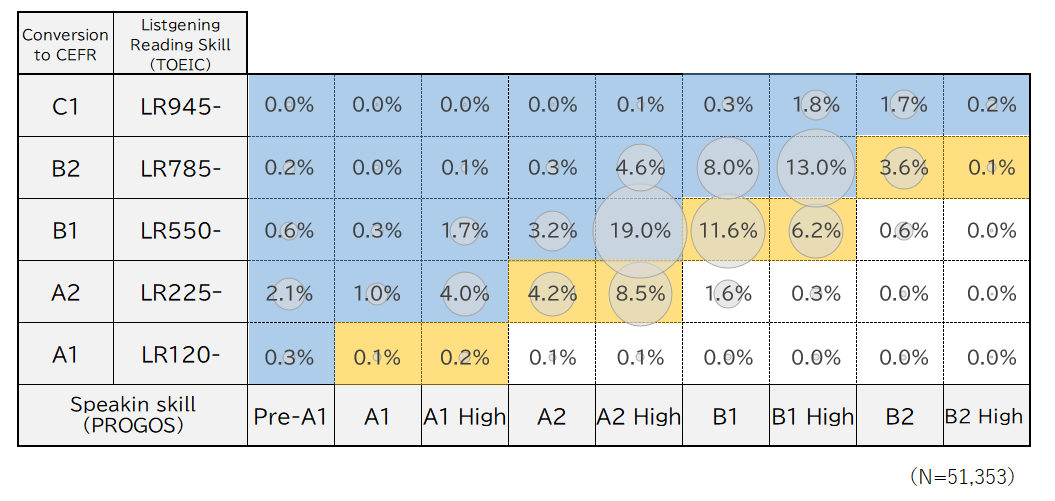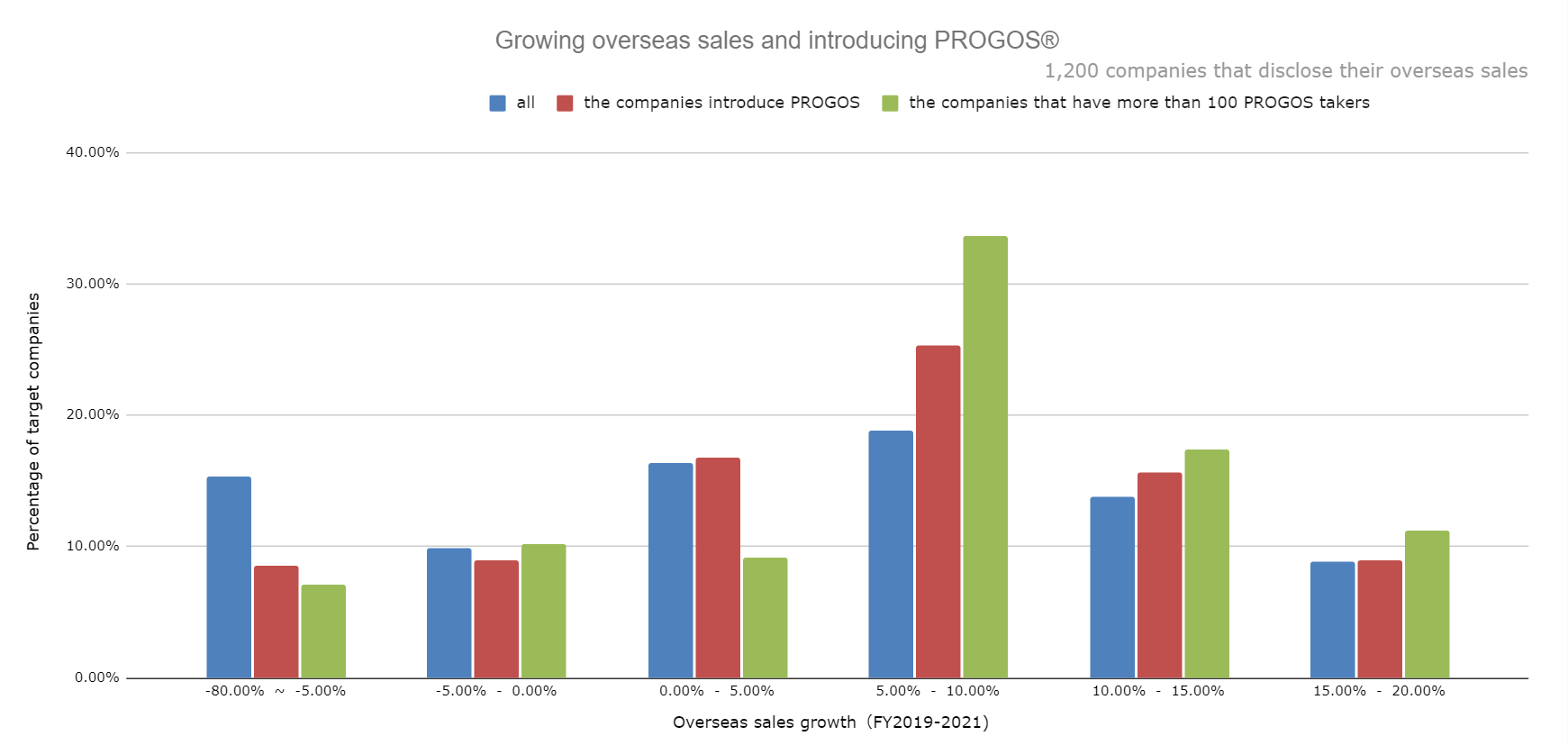Examination data of 420,000* people reveals the reality of the Japanese people’s English speaking skill. Only 6% of people have a level of global business success
PROGOS Inc. (hereafter, “PROGOS”), the subsidiary of RareJob, Inc. (hereafter, “RareJob”), which helps people visualize and improve their skills as an “AI assessment company”, announced the results of a survey on the English speaking skill of Japanese people, utilizing the data from PROGOS® AI business speaking test, which celebrated its third anniversary since its launch in June 2020.

Background
In June 2020, RareJob Group released the PROGOS® English speaking test. The test is widely used by companies and universities in Japan and abroad, with a total of 420,000 tests taken (as of the end of May, 2023). As a tool for visualizing practical English speaking skill in business, the test has been widely used in corporate human resource development training and recruitment activities, as well as in university examinations, and has become firmly established. While it is gaining recognition as “the English speaking test with the largest number of annual test takers in Japan,” we have conducted a survey and analysis of large-scale test-taking data accumulated over the past three years to clarify the actual situation and issues of Japanese people’s English speaking skill.
Result 1: The level of speaking skill for most Japanese people is “A2 High”, which is considered a beginner level.
PROGOS® aligns with CEFR**, an international language proficiency framework. Based on the results of Japanese test takers during the target period***, the English speaking skill of businesspersons (including some university students) was found to be spread across the following CEFR levels:
●The most common level is “A2 High,” which is a beginner level.
●The minimum English skill required in business situations is B1, but only 49.1% of Japanese test takers have a speaking level of B1 or higher.
●The English level acceptable for global business is B2 or above, but only about 6% of Japanese test takers have a speaking level of B2 or and above.
These results indicate that only a small number of Japanese businesspersons are able to use English at a global business level, and that there is a large gap between the level at which they can use some English and the level at which they can use English in business.
** CEFR (Common European Framework of Reference for Languages). Indicates levels of communicative competence.
*** Calculated from data of 340,000 Japanese test takers out of 420,000 PROGOS® takers. It does not represent the English speaking skill of Japanese people as a whole

Result 2. There is a large gap between listening, reading and speaking skills
When using English in business, the four skills of English (i.e. listening, speaking, reading, writing) are used, but “speaking” skills are especially important for proper communication in business situations such as negotiations and meetings. Therefore, we conducted a comparative analysis between the four skills by utilizing data from test takers who took both the TOEIC® L&R and PROGOS® tests.
The data of approximately 50,000 people who took PROGOS® and also had TOEIC® L&R scores were compared in terms of CEFR levels, and it was found that there is a significant difference between listening, reading and speaking skills. According to the results of the data analysis, only 40% of the candidates whose TOEIC® L&R scores indicate that they are at a level equivalent of “B1” for listening and reading skills, actually have the same level in “speaking skill”, and only a little over 10% are at the “B2” level. The following observations can be made from these results:
●To determine speaking skill, it was necessary to measure it with a speaking test.
Converting TOEIC® L&R scores alone do not show an accurate speaking skill.
●Speaking skills, which are important in business, are significantly inferior in comparison to the listening and reading skills.
Very few people have speaking skills that are balanced with their listening and reading skills.

Result 3: Companies with growing overseas sales are more likely to use speaking tests.
We also investigated the relationship between the growth of overseas sales as an indicator of a company’s progress in globalization and their staff’s English speaking skill. Based on data from approximately 1,200 companies that disclose their overseas sales, we compared the average annual growth rate of overseas sales from FY 2019 to FY 2021 and the companies that used PROGOS® from June 2020 to the end of May 2023, and found the following.
In terms of the company’s growth rate, the highest average annual rate of foreign sales was between 5-10%. Within this range, the percentage of companies that used PROGOS® with a high number of candidates (100 or more) is overwhelmingly high. The percentage of companies that have used PROGOS® in some form or another is also high. Many companies with 0-20% of growth in overseas sales used PROGOS®.
The statements above suggests that more and more companies will want to visualize English speaking skills in order to accurately assign personnel and develop language skills, which is inline with the growing amount of business conducted in English on a global front. As more companies accelerate overseas expansion in their mid- to long-term business plans in concurrence with the COVID-19 pandemic, this is a trend that deserves attention as a measure for the skill aspects of the human resources that will support such expansion.

Companies that have not introduced PROGOS® often commented that they do not need it because they use TOEIC® L&R, or because English is used only by a few people. However, as a result of the increase in overseas contacts, including online, an increasing number of companies are facing a lack of speaking skills among their employees and have decided to use PROGOS®.
Result 4: The speaking skill of Japan is low compared to other Asian countries
PROGOS® is used in 54 countries and regions. The results of a comparison of speaking skills by country/region with more than 450 of these test takers showed that among the Asian countries, Japan and Thailand had the highest number of “A2 High” levels and this is the lowest among the Asian countries, while Cambodia, the Philippines, and India had the highest number of “B1”levels. However, this does not represent the speaking skills of an entire country, but the comparison of a certain number of test takers still revealed a clear difference in levels between countries.
Outlook
The environment surrounding human resource development in Japan is currently undergoing significant change.The practice of hiring all new graduates at once, seniority-based systems, and lifetime employment during the era of rapid economic growth is fading away. Whereas the autonomous career development, visualization of skills, reskilling, hiring by job type, job-based employment, and job posting systems are becoming more widespread. Human capital management, in which investment in people is viewed as an asset rather than a cost, is being promoted. In the midst of these changes, English speaking skills are essential skills for promoting business globalization, and the visualization of levels through CEFR, an international language proficiency framework, will become even more important for implementing data-driven HR policies.
In addition to increasing the number of PROGOS® examinations, we will combine the data with data on other skills needed to develop global leaders, and promote data-driven utilization to optimize recruitment, placement, and training of human resources. We will also build an assessment data platform, which will be our unique strength.
PROGOS® Overview
| Test format | Online test with automated questions/prompts (audibly or visually) presented on screen |
| Test time | Approx. 20 min. |
| Test Contents | Interview, Reading Aloud, Presentation, Graphic Presentation, Communication Activity |
| Scoring system | Automatically scored |
| Evaluation | Final Evaluation Results : CEFR-J Level Evaluation Criteria: six (6) Aspects defined by CEFR* |
| Evaluation Scales | Pre-A1 to B2 High & above (AI scoring version) |
| Notification of Results | Fastest 2 to 3 minutes after taking the test (AI version) |
| Test Requirements | PC/tablet/smartphone with microphone and speaker functions OS: Windows (Windows 8.1 or higher recommended)/Mac (MacOS X 10.14 or higher recommended)/ChromeOS latest version Browsers: Google Chrome ・Mozilla Firefox ・Microsoft Edge ・Safari |
About PROGOS Inc.
Location: 2F Kyocera Harajuku Building, 6-27-8 Jingumae, Shibuya-ku, Tokyo
President and Representative Director: Shunichi Tsubouchi,
URL: https://www.progos.co.jp/
Business: Assessment and development of global leaders
Press Contacts
PR Department, RareJob, Inc.
Email: press@rarejob.co.jp
